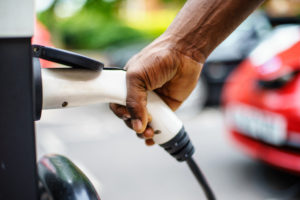Funding will go to third-party organizations — provincial and municipal governments and non-profits, in particular — that are able to co-fund and administer payouts to recipients installing urban and suburban EV chargers

Funding will go to third-party organizations — provincial and municipal governments and non-profits, in particular — that are able to co-fund and administer payouts to recipients installing urban and suburban EV chargers
Natural Resources Canada recently opened its third request for proposals for its Zero-Emission Vehicle Infrastructure Program (ZEVIP), a key component of the federal government’s efforts to increase the availability of electric vehicle chargers across Canada.
In this RFP, NRCan is requesting proposals from third-party delivery organizations — such as provincial and municipal governments or non-profit organizations — that are able to share the costs of purchasing and installing EV infrastructure.
Delivery organizations whose applications are successful will then provide funding for Level 2 and DC fast chargers to the ultimate recipients of their choice. NRCan is running this RFP until December 10.
Public, workplace, MURB and fleet charging
Paula Vieira, director of NRCan’s fuel diversification division, says the ZEVIP is designed to bring EV charging to “where Canadians live, work and play” — that is, primarily urban and suburban areas.
As such, the ultimate recipients of its funding must be charging projects serving public-use parking lots, on-street parking, workplaces and multi-use residential buildings, as well as light, medium and heavy-duty commercial fleets and mass transit fleets.
NRCan will pay up to 50 per cent of total project costs to successful delivery organizations up to $2 million; each ultimate recipient will be eligible to receive up to $100,000 of that amount.
Level 2 chargers will be funded to a maximum of $5,000 per connector, 20kW-to-49kW fast chargers to a maximum of $15,000 per charger, and 50kW-fast chargers up to $50,000 per fast charger. Delivery organizations must seek funding for at least 20 EV chargers in order to apply.
20,000 chargers by 2024
The ZEVIP was established in 2019 with a pool of $130 million to be allocated over five years. This is the third request for proposals under the program’s banner, and the first to take a third-party delivery approach. A fourth RFP is set to open this December, and NRCan plans to continue issuing several per year until 2024.
“Our ultimate outcome is a target of 20,000 new chargers by the program’s end,” says Vieira. “We’ve deemed projects eligible under our first RFP that will result in over 2,200 chargers.”
The ZEVIP is one of two NRCan programs funding the expansion of zero-emission refuelling infrastructure across Canada. The other, the Electric Vehicle and Alternative Fuel Infrastructure Deployment Initiative (EVAFID), was established in 2016 and provided with $96.4 million to operate until 2022. Whereas the ZEVIP aims to bolster charging infrastructure in urban and suburban areas, the EVAFID targets projects along Canada’s national highway system.
“The two actually work together, because it really allows Canadians to use EVs the same way they use conventional vehicles,” says Vieira.
According to Vieira, the growing demand for EV chargers has caused a surplus of applications for funding to both programs which will likely continue for their duration.
“There is a huge need for infrastructure, and there really is a willingness to partner with government to deploy that infrastructure.”












